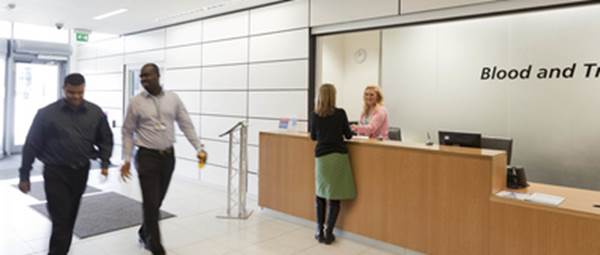Research updates
We are supporting national research dedicated to understanding coronavirus (COVID-19) and improving the outcome for patients.
Many of our research, manufacturing and testing teams are involved in work alongside other sectors of the healthcare system to help analyse and control coronavirus.
C-Velvet study
We are carrying out a study aimed at confirming whether vaccination creates a huge increase in antibody levels in people who have already had coronavirus.
The study, called C-Velvet, involves going back to 100 people who donated convalescent plasma after recovering from COVID. They are being asked to give blood samples 28 days after their vaccination.
The neutralising antibody levels will be compared against the antibody level from when they came as plasma donors.
Dr Lise Estcourt, head of NHS Blood and Transplant’s Clinical Trials Unit, who is the study lead, said: "Our C-Velvet study could have two benefits for potential treatments.
"We may identify plasma ‘super donors’ who provide the very high antibody levels needed for any trial of hyperimmune plasma.
"Secondly, our study could inform the development of monoclonal antibody therapies which react against more viral variants."
Providing blood samples for research
Testing blood to understand how many people have had, or currently have, coronavirus has been outlined as a priority for this government in the response to the outbreak in the UK.
We are supporting some of the research that is underway, by sharing some samples of blood that we hold already. We provide the leftover portion of the samples we routinely take when you give blood and use for mandatory tests to make sure your donation is safe for transfusion.
We are supplying Public Health England (PHE) with blood samples to help with understanding how many people in the population are likely to have had the virus since the start of the outbreak and how this is changing over time.
Working with the Wellcome Trust, PHE and leading healthcare organisations, this information is being used to better understand how the virus has spread and to help manage the response to the pandemic.
We are also helping the research effort by creating a bioresource of plasma samples that will support researchers with coronavirus-related projects.
Find out more about how samples from blood donations are being used
Providing testing machines
We and the other UK blood services are working together to support the Government's plans to increase the volume and speed of testing for coronavirus.
We loaned a Nucleic Acid Technology (NAT) testing machine to Public Health England's (PHE) Porton Down testing facility which increased capacity for testing. The NAT machine can test for COVID-19 in nasal swab samples.
The Welsh Blood Service also lent its NAT testing machine to PHE for COVID-19 testing and we performed NAT testing of samples from Welsh blood donors while their equipment is out on loan.
We are also working with the Scottish National Blood Transfusion Service to establish further contingency for each other.
This is a great example of how we have worked with other UK healthcare organisations to make rapid progress in an emergency.Stephen Thomas
NHSBT Associate Director for Technical and Scientific Development
Cell therapy trial (REALIST COVID-19)
Our Cellular and Molecular Therapies team has been manufacturing the cells used in a new clinical trial, led by Queen's University Belfast and funded by the Wellcome Trust and Health and Social Care in Northern Ireland Research and Development (HSCNI R&D).
The REALIST trial is investigating the use of Mesenchymal stromal cells (MSCs) in the treatment of COVID-19 patients with acute respiratory syndrome (ARDS). These cells have been shown in experimental models to reduce inflammation, fight infection and improve the repair of injured tissue.
The cells are produced from umbilical cord tissue supplied by our Cord Blood Bank.
All 60 patients have now been recruited for this placebo-controlled phase II trial from multiple sites across the UK and the results are undergoing review prior to publication. The same team will now be undertaking a similar trial for ARDS patients not suffering from COVID-19.
Other studies
NIHR priority COVID-19 studies list
PNAS article on the effectiveness of convalescent plasma therapy

